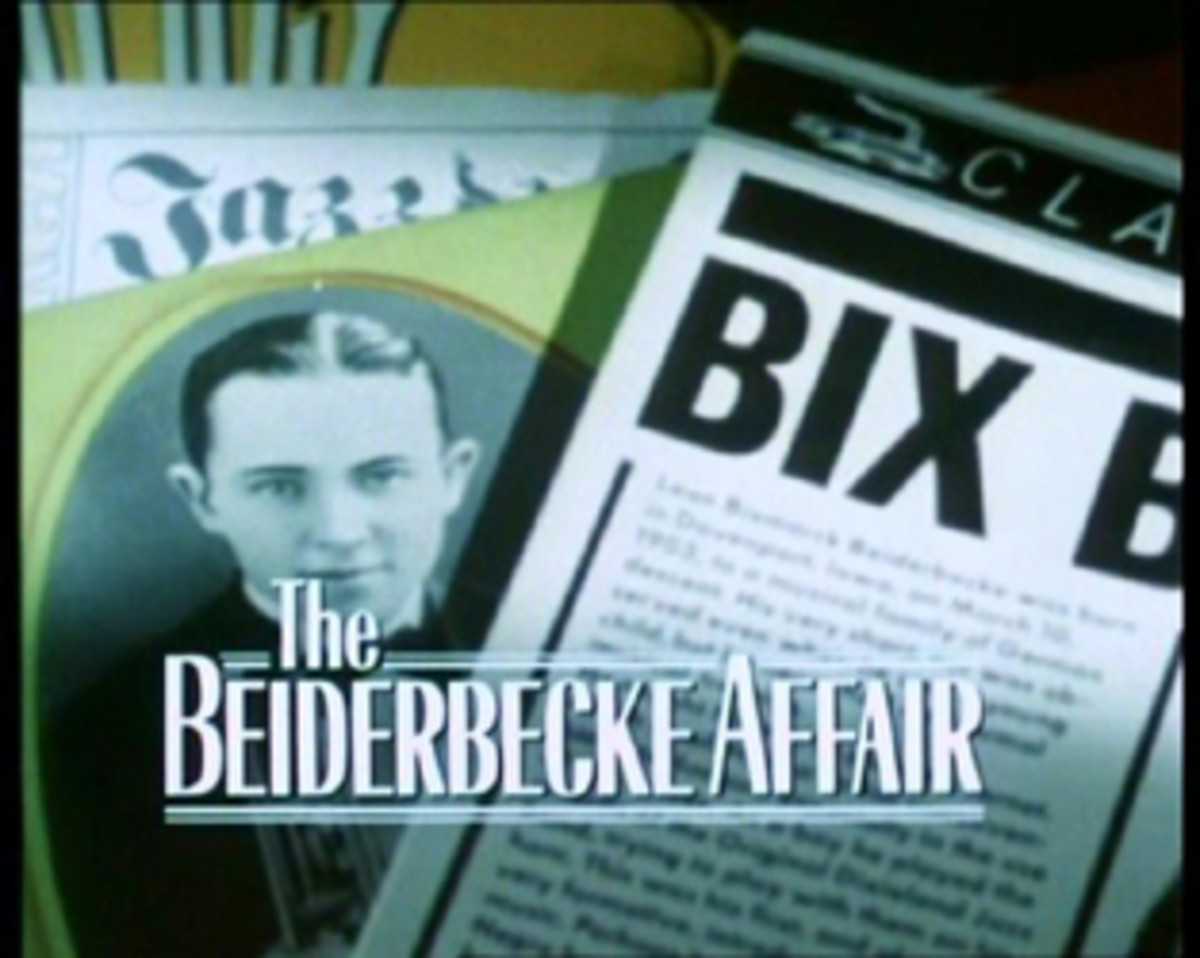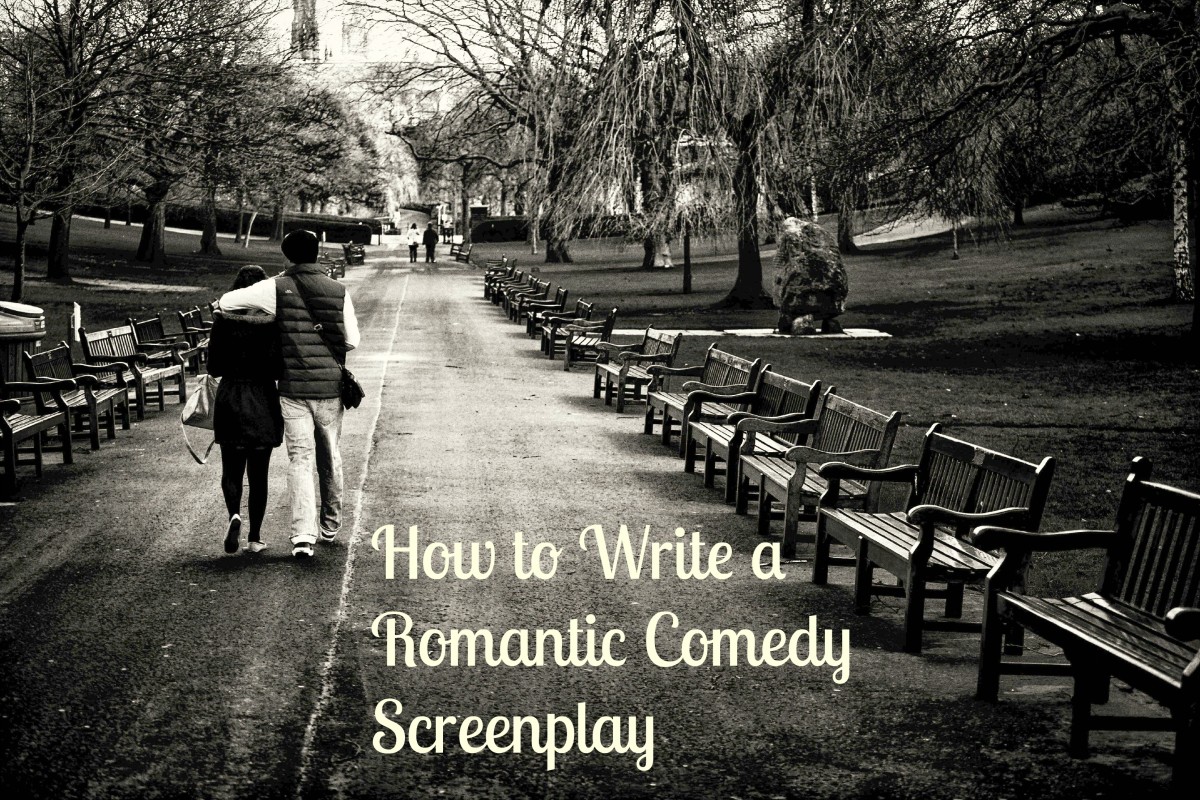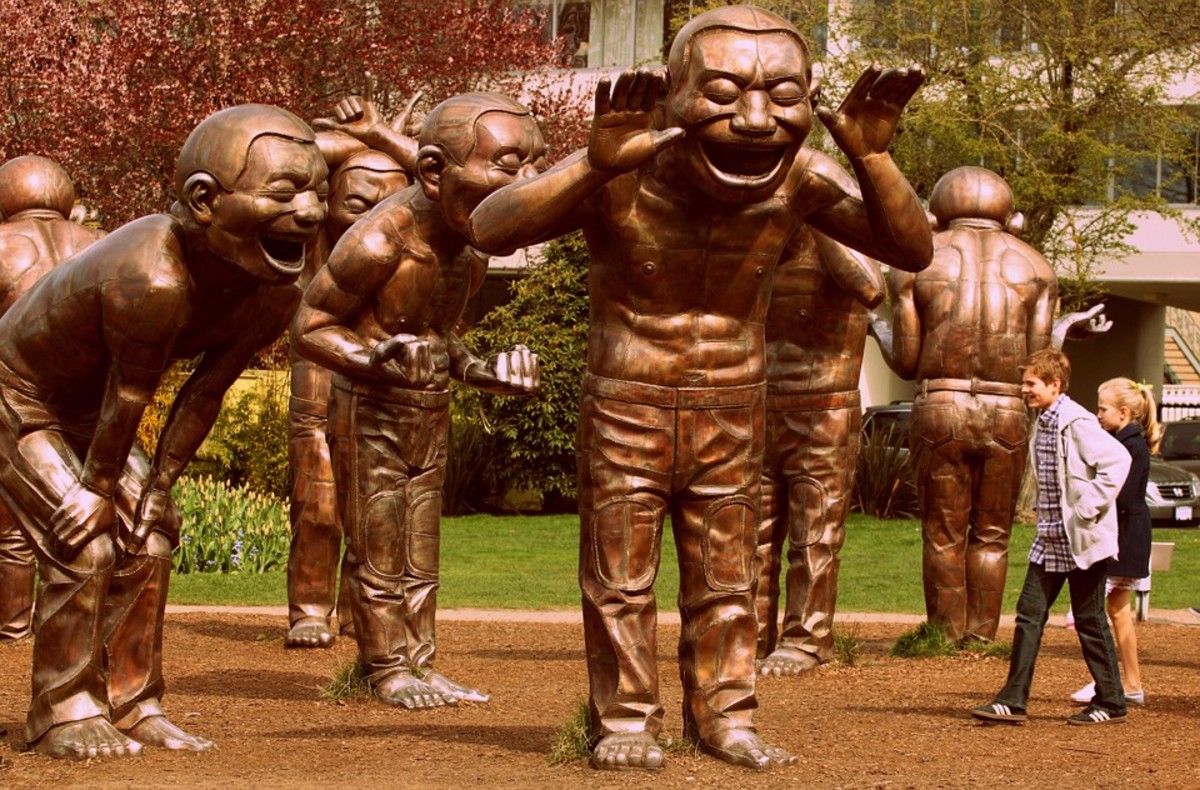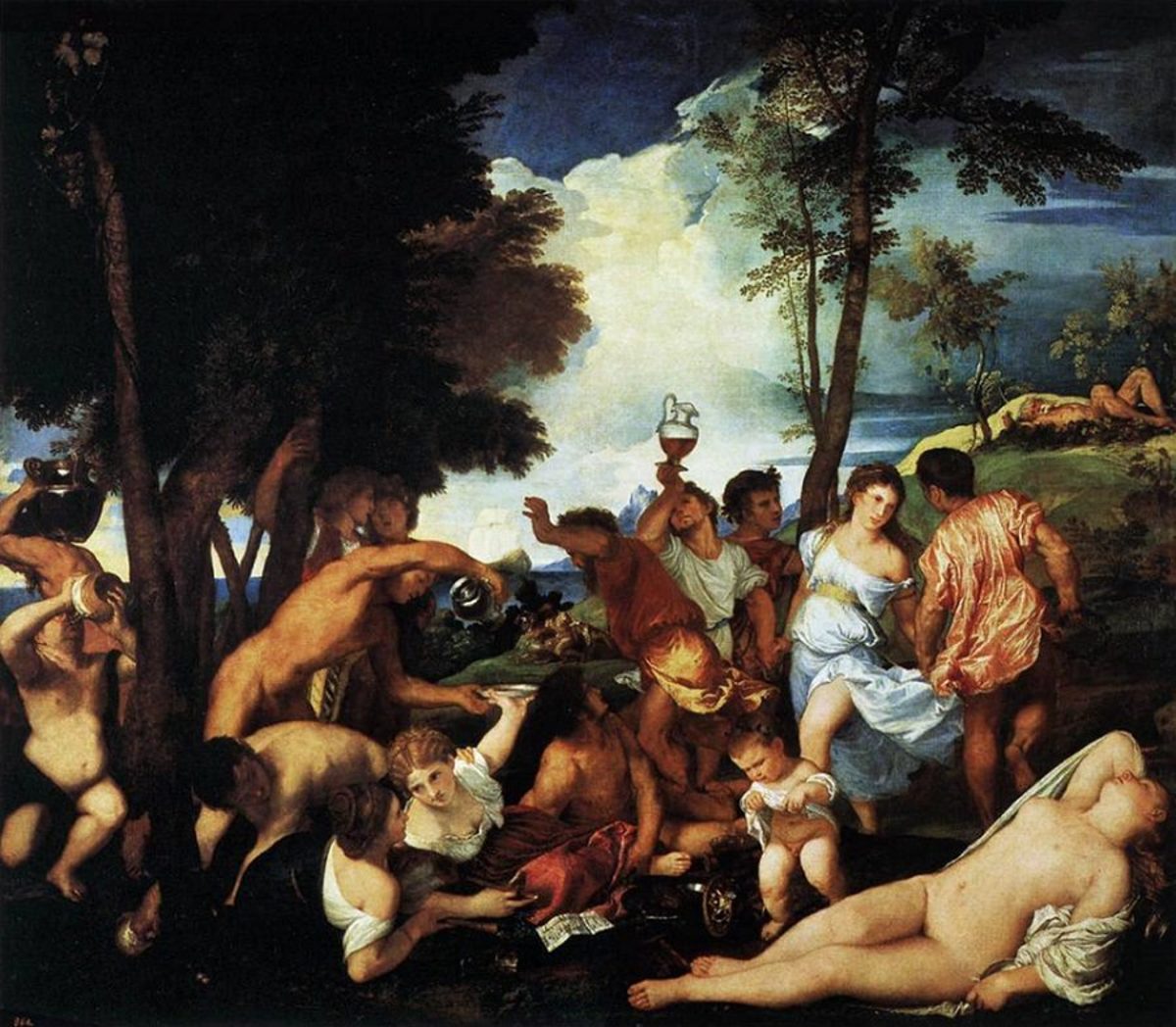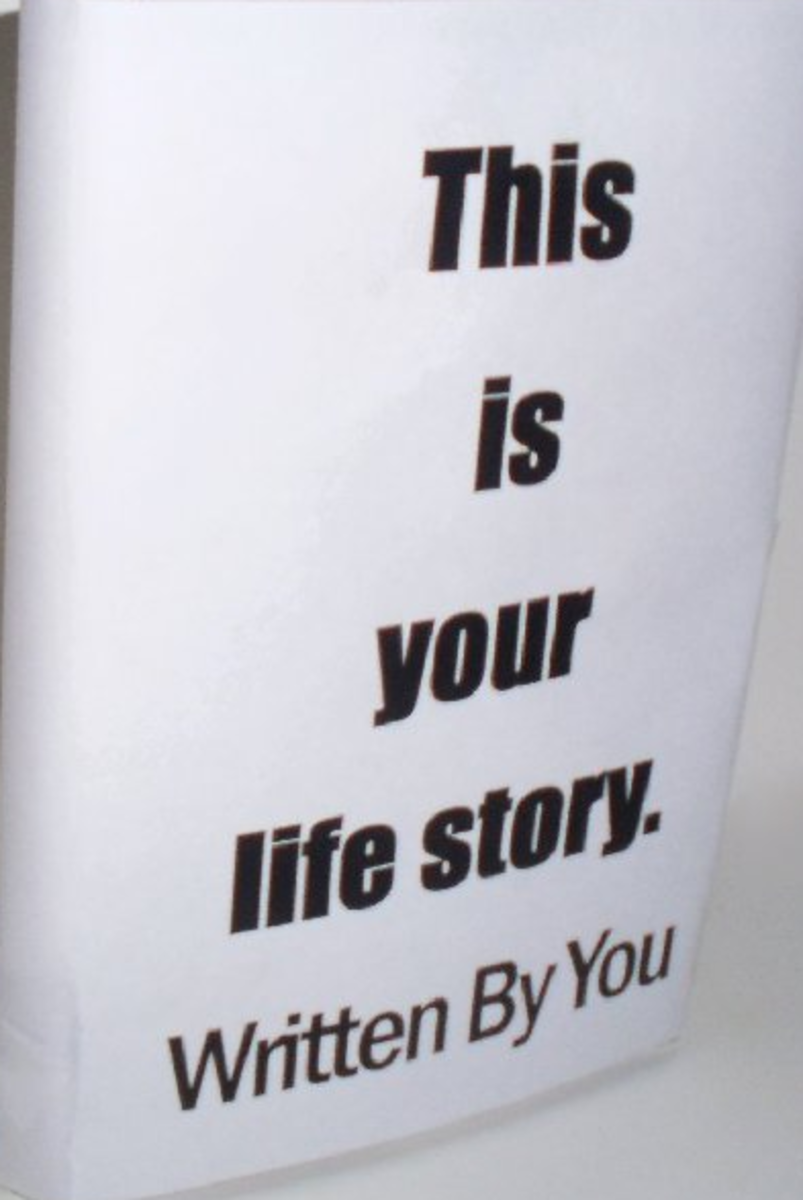How To Write Comedy - Comedy Genres Explained
Old Comedy is Satirical
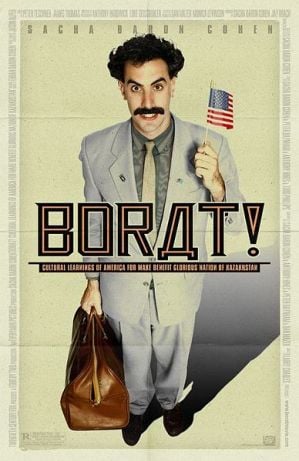
Which Comedy Genre to Write For?
When deciding upon a career as a comedy writer it is a good idea to get familiar with the genre of comedy.
Comedy as an artform has many different branches and the wise student of comedy will investigate these through exploring the key works recommended.
Ancient Greek Comedy
Around 500BC comedy entered the theatrical world of Ancient Greece. Hundreds of writers produced hundreds of plays and this movement flourished and branched into three distinct forms known as Old Comedy, Middle Comedy and New Comedy. From these early distinctions we can derive the origins of many comedic works today.
In the table below I've listed the main features of each comedic branch from Ancient Greek Comedy and some suggestions of modern texts or forms that embody many, though not all, of these characteristics. We can begin to see threads of commonality in the comedy of today and can begin to decide what comedy genre to write for and how me might structure this. I've stuck largely to film and TV texts to make the comparisons easier for mainstream readers.
Ancient Greek Comedy Genres
Old Comedy
| Middle Comedy
| New Comedy
|
|---|---|---|
Sketches, buffoonery, lampoon of public figures, music comedy, satire, farce, grotesque and obscene, spectaculars
| Ordinary citizen life, general ridicule, impersonal politics based on use of iconoclastic characters. Stock characters used; parasites, revellers and drunks, courtesans, philosophers, gloating soldiers, conceited cooks. The use of literay puns and one-liners, real settings, mythology and burlesque masks.
| Comedy of errors and good manners; surprise and recognition, situation comedy, fears, foibles, prologues, face to face audience messages, voice over, prostitutes who shy from commercialism and have good hearts, angry old men, ex machina endings (god out of the machine or the idea that a problem that seemed god intented could in fact be solved by evaluating the human condition). 5 act structure. Black comedy/satire.
|
Modern Texts Using elements of Old Comedy
| Modern Texts using elements of Middle Comedy
| Modern Texts using elements of New Comedy
|
Stand Up Comedy - Eddie Murphy; Raw (1983) and Delerious (1987)
| Sex in the City (1988 - 2004)
| Desperate Housewives (2004) onwards
|
National Lampoon's Vacation (1983) et al
| Police Academy (1984) onwards
| Four Lions (2010)
|
The Naked Gun (1988) et al
| Run Fat Boy Run (2007)
| Holy Rollers (2010)
|
Borat (2006)
| East is East (1999)
| Macbeth - William Shakespeare (first performed 1611)
|
A Fish Called Wanda (1988)
| Night at the Museum (2006)
| Monsters Inc (2001)
|
Evan Almighty (2006)
| Ratatouille (2007)
| Wall E (2008)
|
A Fish Called Wanda - Otto and Old Comedy Grotesque Buffoonery
A Fish Called Wanda (1988)
A Fish Called Wanda (1988) - The Monty Python Team
The Monty Python Team specialise in lampoon of public figures and iconoclasts. The important thing to remember is that the development of Old Comedy, Middle Comedy and New Comedy in Ancient Greece was concurrent. So each type of comedy borrowed from the others.
The Monty Python team, a group of intellectual comics who went to Cambridge University in the United Kingdom embraced the tool of spectacular in the Old Comedy genre most notably in The Life of Brian (1979) where the music comedic song "Always look on the bright side of life" plays over the crucifixion of Brian (metaphorically Jesus).
A Fish Called Wanda (1988) follows similar spectacular buffoonery in the character of Otto alongside the grotesque in the fish eating scene with Ken.
The application of music comedy can be seen in the video to the right as Otto and Wanda (Jamie Lee Curtis) make love (farcically!). (NB some swearing in the video).
Eddie Murphy's Raw(1983) and Delerious (1987) explained further in How To Write Stand Up Comedy - From Eddie Murphy to Lee Evans.
Old Comedy - Exposing satire through musical farce - Borat and anti semitism
Old Comedy Key Texts
Satire to Expose Ugly Society
Borat (2006) uses Old Comedy techniques to expose anti-semite attitudes in Arizona USA. Classic techniques of buffoon (Borat the character), music comedy and chorus (the song "Throw the Jew Down the Well"), and satire (situational, as the people in the bar cheer along) subvert the assumption that anti-semite attitudes are no longer accepted by mainstream society.
Old Comedy techniques use farcical situations in particular to make incredibly political points. The ultimate irony is that Sascha Baron Cohen who wrote Borat, and plays the character of Borat, is a Jew.
The National Lampoon series runs a similar line of exposing corrupt attitudes in modern society, and in The Naked Gun, Eva Braun's famous line - "Is that a gun in your pocket or are you just happy to see me" was used by Priscilla Presley's character.
This caused public outrage at the time as it was said by Hitler's wife and had not been in a public text considered an art text for the mainstream before. This was groundbreaking - and disturbing - as many people used the phrase in common speech and confessed they did not know the origin of it.
For an examination of the use of spectacular, you can't find a better modern comedy text than Evan Almighty (2006) where Evan builds Noah's Arc in his backyard under God's instructions.
Sex In The City - Wedding Dress Scene
Middle Comedy - Lost Art or Alive and Well?
Most of the texts from Ancient Greece depicting Middle Comedy don't exist. Historians have put together the list of characteristics described in my table from their research into the biographical scraps they have from the Middle Comedy artists. I think that modern Middle Comedy is alive and well. Consider the following:
Sex in the City 2 - Mythology and Burlesque with a dash of Courtesan
The comedy of Sex in the City 2 (2010) lies in the clash between ordinary citizen life and the requirement to be a courtesan. The four female characters led by Carrie aspire to marry princes of New York, creating a setting where it is impossible to critique the courtesan which leaves the comedic function of ridicule alive in the form of minor characters such as Sandford and Big.
Mythology takes shape in the form of the endless parade of modern day myth makers known as high couture designers. Burlesque shapes the sexual relationships of the women, with extreme sexual lives imbibed in the title itself and the use of constant sexual costume, play and masquerade.
Run Fatboy Run - Hitting the Wall Scene
General Ridicule - Creating Comedic Empathy.
General Ridicule, Revellers and Philosophers
Police Academy (1984) and Run Fat Boy Run (2007) both parody physical fitness and use passerbys as revellers. Simon Pegg plays Dennis, a man who left his fiancé at the altar and decides running a marathon will sort out his problems. Set like all Middle Comedy Texts in a real location and centred around frienships, home and careers, Dennis gets philosophical when he "hits a wall".
Revellers differ to spectacle, and the video scene on the right is interesting to ponder. Revellers engage with the subject, supporting, encouraging and heckling, a bit like a gang of drunks in a bar. Spectacle imagines onlookers in awe at the scene and that's the key difference.
All Middle Comedy characters are subject to general ridicule, which is lighter and gears itself towards resolution of the characters' dilemmas. Dennis wins his fiancé, and the police academy class pass the training stage and gain promotion. Carrie eventually marries Big.
East is East (1999) Trailer
East is East and Ratatouille - Cantankerous Cooks
In East is East (1999) the action centres around a family who own and run a fish and chip shop. Characters follow patterns familiar to Middle Comedy, general ridicule of culture, mythology in costume, philosophical reflections from the brothers, and the courtesan aspect in the form of arranged marriage proposals. The role of the cantankerous cook is fulfilled through the father, George, an immigrant from Pakistan.
Where better to find a cantankerous cook than France? The characters of Linguine and Remy in Ratatouille (2007) intersect to contrast desires of underclass (Remy) with privilege (Linguine) to ridicule the idea that the best jobs are taken by those who deserve them.
Middle Comedy and Philosophy - Night At The Museum
The Legend of Sacajawea
Night of the Museum (2006) centres the drama around the plight of Sacajawea, and the philosophical depiction of her freedom, or lack of it. Playing with this them, the museum curator Larry Daley, played by Ben Stiller, juxtaposes the modern values of feminism with understanding of the values and attitudes Sacajawea expresses throughout the film. Larry takes on the role of correcting all of the characterizations in Night of the Museum, updating their philosophical views for the modern day they find themselves in.
While this text can be classified magical realism, the root of the comedy lies in the ridicule of philosophy and the exploration of past attitudes to the iconoclastic characters. For comedy writers, focusing the drama on a significant person of history can lead to interesting misunderstandings and mishaps as that character interacts. (Think Bill and Ted's Excellent Adventure, Back To The Future etc.
Desperate Housewives - Kiss Them Goodbye - Series 8
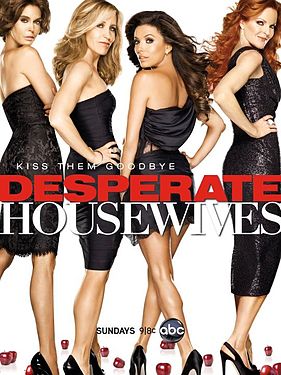
New Comedy - Prostitute Characters Who Shun Commercialism
Ironic isn't it, that the comedic function of Desperate Housewives (2004+) lies in the clash between four women with debatable morality and the pressures of modern consumer culture. Always driven by the desire to protect their wealth, these "prosititutes with good hearts" attempt to overcome a calamity of circumstances only to eventually resolve them by searching the heart of the human condition. Desperate Housewives is at its core, a black comedy.
Consider the current series and the status of the women. Susan, played by Terri Hatcher, had to engage with internet porn when herself and Mike had financial trouble. When Carlos and Gabby (played by Eva Longoria) had financial trouble, Gabby had an extra marital affair with the gardener. Bree Van Der Camp (played by Marcia Cross) dived into an alcoholic sex orgy after losing her cake business to an unscrupulous son. Lynette Scavo is the only non-prostitutional main character left to fall, and with Series 8 promising to be the final series, the possibility that she will looms as her husband makes her a victim of infidelity and is calling for divorce. The most stable role model on Wisteria Lane is going to have to prostitute herself to win a new relationship.
The overarching storyline of Desperate Housewives is that each time one of these good hearted women (prostitutes) is morally crossed, someone gets murdered. The series employs all the features of new comedy. Surprises and recognitions connected to nasty characters (Orson, Chuck, the original Mary Ellis murder plot, Gabby's stepfather), ex machina endings where characters "come clean" (Mike, Ben and the loan shark, Tom and his infidelity with Renee), and a prologue which summarises fears, foibles and errors in every episode.
Surpise and Recogntion - New Comedy and Wall E
Wall E and Eva
Wall E (2008) demonstrates a similar comedic function through the character of Eva, who provides momentum for the story. Wall E is surprised to recognise another robot, albeit one who refused to prostitute herself to the over commercial society she came from. He falls in love to the music of prologue where fears, foibles and errors by a society obsessed with mass consumerism plays out to us. The ex machina ending takes the form of a plant, which needs to be inserted into the computer system that runs the world in order to restore it, taking the concept of god firmly out of the equation, and speaking to the heart of the human condition conflict of man versus nature.
Black Comedy - Holly Rollers (2010) trailer
Foibles, Fears and Errors in Five Act Structures
Got a great new comedy to write - make it religious?
Four Lions (2010), Holy Rollers (2010) and Macbeth by William Shakespeare (1661) all follow the five act structure.
Holy Rollers (2010) features Jesse Eisenberg playing an American Orthodox Jew who reasons, in error, that it is acceptable under Judaism to sell drugs to Gentiles. This sets the stage for the elements of New Comedy to play out. Surprise occurs when the Jewish drug mules are apprehended under law, recognition occurs in the reconciliation between Sam Gold (Eisenberg) and his angry old man father Mendel Gold (Mark Ivanir) when the ex machina sees Sam inside a prison in orange overalls reminiscent of Guantanamo inmates.
Holly Rollers (2010) has its share of prostitues with good hearts in the form of Rachel Apfel (Ari Graynor) who spends most of the plot trying to seduce every orthodox Jew on screen and eventually saves lives when a drug deal goes wrong. She makes a choice against the commercialism of gain from the drug trade to do this.
New Comedy - Four Lions (2010)
Four Lions (2010) - Debut Feature Jihad Satire
In Four Lions (2010) four Muslim men become radicalised and plot to bomb the London Marathon. Using a classic comedy of errors plot, comedy ensues as the group wear amusing costumes to conceal their explosives — Omar as the Honey Monster; Waj as a man riding an ostrich; Barry as a Teenage Mutant Ninja Turtle; and Hassan as a clown.
An interesting character is an angry grumpy white man called Barry, who joins the jihadis in their cause. The neighbour to the jihadis plays the role of prostitute with a good heart who fancies all of these men, and earns their trust. Ex machina ending results in the death of Osama Bin Laden being blamed on Omar, one of the jihadists, who mis fired a rocket while training in Pakistan. Error! Fears and foibles are continually explored in the characterisations.
Billed as a black comedy, the film grossed $4.5 million and was nominated at the Sundance Festival for comedy.
New Comedy - Mishaps, Fears, Foibles and Errors
Monsters Inc (2001) follows classic new comedy formula. Beginning with a prologue introduction where the dilemma of the work of the monsters is outlined. Some resistance to the status quo emerges in the two main characters; James P Sullivan (John Goodman) and Mike Wazowski (Billy Crystal) who sense the philosophy of the Monsters Inc company might be flawed. Surprise occurs as the two monsters discover "Boo", a human girl they bring into the world of the monsters.
The plot centres around the double world recognition idea, whereby if humans find out the monster world really exists, they might destroy it. It is here that mishaps, fears, foibles and errors unfold, as James and Mike deceptively hide Boo from the ruling monsters.
In a superb example of ex machina ending the Monstropolis residents discover a child's laughter provides more power than the screams, and everyone changes worldview accordingly.
Macbeth (1661) - New Comedy?
Was Macbeth the Four Lions or Holy Rollers of its day? It has all the elements of a new comedy drama, where a series of mishaps lead to the ex machina ending of regime change. Believed to be modelled on the bloodthirsty gunpowder plot against King James I, it is not hard to imagine the audience laughing out loud. Oh yes, there's a hell'uv'a lot of laughs in Macbeth, with the devil playing the jury against the "equivocators".
Consider, all the action, murders and betrayals happen in the house of Macbeth and his wife Lady Macbeth. Duncan comments upon the castle in Act 1; "This castle hath a pleasant seat. The air / Nimbly and sweetly recommends itself / Unto our gentle senses."
- I'm laughing already.
Something to think about. A good essay I found about this explains the case for Macbeth as satire.
Old Comedy, Middle Comedy, New Comedy - Archetype Genre Definitions Explained
I trust you can appreciate the difference between comedic styles as defined by the Ancient Greek writers. Academically, exploring comedy genre from this angle is defining the archetypal generic definition of comedy. You will have noticed that comedy infects many media subgenres, including romance, crime, political satire, magic realism and others. These are considered sub-generic classifications and you will find them in different branches of the artforms that have been defined post Ancient Greece. I hope this hub goes a long way towards helping you identify where the comedy comes from next time you view or read a comedic text.










